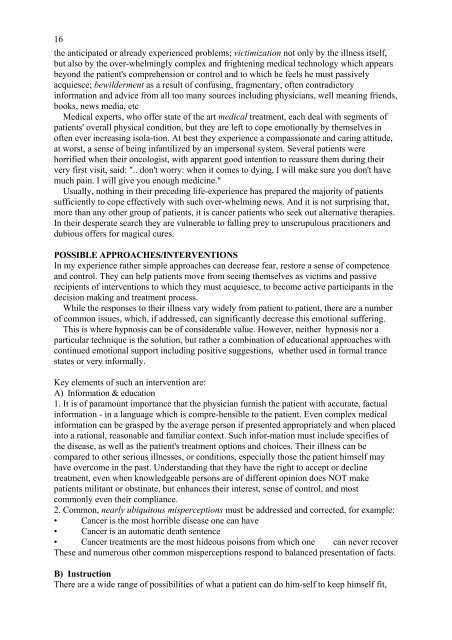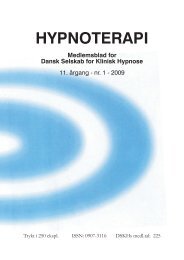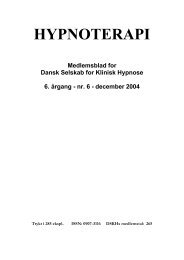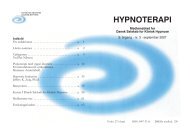HYPNOTERAPl - Dansk Selskab for Klinisk Hypnose
HYPNOTERAPl - Dansk Selskab for Klinisk Hypnose
HYPNOTERAPl - Dansk Selskab for Klinisk Hypnose
Create successful ePaper yourself
Turn your PDF publications into a flip-book with our unique Google optimized e-Paper software.
16<br />
the anticipated or already experienced problems; victimization not only by the illness itself,<br />
but also by the over-whelmingly complex and frightening medical technology which appears<br />
beyond the patient's comprehension or control and to which he feels he must passively<br />
acquiesce; bewilderment as a result of confusing, fragmentary, often contradictory<br />
in<strong>for</strong>mation and advice from all too many sources including physicians, well meaning friends,<br />
books, news media, etc<br />
Medical experts, who offer state of the art medical treatment, each deal with segments of<br />
patients' overall physical condition, but they are left to cope emotionally by themselves in<br />
often ever increasing isola-tion. At best they experience a compassionate and caring attitude,<br />
at worst, a sense of being infantilized by an impersonal system. Several patients were<br />
horrified when their oncologist, with apparent good intention to reassure them during their<br />
very first visit, said: ".. don't worry: when it comes to dying, I will make sure you don't have<br />
much pain. I will give you enough medicine."<br />
Usually, nothing in their preceding life-experience has prepared the majority of patients<br />
sufficiently to cope effectively with such over-whelming news. And it is not surprising that,<br />
more than any other group of patients, it is cancer patients who seek out alternative therapies.<br />
In their desperate search they are vulnerable to falling prey to unscrupulous pracitioners and<br />
dubious offers <strong>for</strong> magical cures.<br />
POSSIBLE APPROACHES/INTERVENTIONS<br />
In my experience rather simple approaches can decrease fear, restore a sense of competence<br />
and control. They can help patients move from seeing themselves as victims and passive<br />
recipients of interventions to which they must acquiesce, to become active participants in the<br />
decision making and treatment process.<br />
While the responses to their illness vary widely from patient to patient, there are a number<br />
of common issues, which, if addressed, can significantly decrease this emotional suffering.<br />
This is where hypnosis can be of considerable value. However, neither hypnosis nor a<br />
particular technique is the solution, but rather a combination of educational approaches with<br />
continued emotional support including positive suggestions, whether used in <strong>for</strong>mal trance<br />
states or very in<strong>for</strong>mally.<br />
Key elements of such an intervention are:<br />
A) In<strong>for</strong>mation & education<br />
1. It is of paramount importance that the physician furnish the patient with accurate, factual<br />
in<strong>for</strong>mation - in a language which is compre-hensible to the patient. Even complex medical<br />
in<strong>for</strong>mation can be grasped by the average person if presented appropriately and when placed<br />
into a rational, reasonable and familiar context. Such in<strong>for</strong>-mation must include specifies of<br />
the disease, as well as the patient's treatment options and choices. Their illness can be<br />
compared to other serious illnesses, or conditions, especially those the patient himself may<br />
have overcome in the past. Understanding that they have the right to accept or decline<br />
treatment, even when knowledgeable persons are of different opinion does NOT make<br />
patients militant or obstinate, but enhances their interest, sense of control, and most<br />
commonly even their compliance.<br />
2. Common, nearly ubiquitous misperceptions must be addressed and corrected, <strong>for</strong> example:<br />
• Cancer is the most horrible disease one can have<br />
• Cancer is an automatic death sentence<br />
• Cancer treatments are the most hideous poisons from which one can never recover<br />
These and numerous other common misperceptions respond to balanced presentation of facts.<br />
B) Instruction<br />
There are a wide range of possibilities of what a patient can do him-self to keep himself fit,














